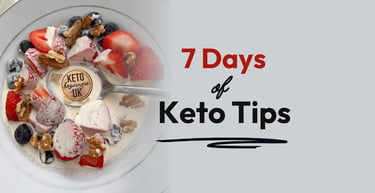The Best & Cheapest Travel Insurance Policy
The smartest moves for your health when on the road.
Lisa Beaumont, Ketogentility.co.uk
10/31/20246 min read


Ah, the joy of travel!
The open road, new faces, a few conundrums – like discerning the difference between yogurt and cream for your coffee in the local supermarket because you can't read the labels. Or, wandering through a scenic town, and your phone battery suddenly decides it’s done for the day and you can't remember the name of your accommodation. Or arriving at your Airbnb with your fingers crossed that the wifi can keep up with your work. Or making a snap decision to board the train that's about to leave even though you're not 100% certain it's going in the right direction...
Why I take out insurance
With all these little uncertainties, the last thing I want to fret over is my health so, as well as taking good care of myself, I always get travel insurance just to be on the safe side; not really for the contents cover, but for the medical element of it.
Listen, I'm no big fan of the medical industry and I sure as heck do whatever I can to avoid seeing a doctor, but if something awful were to happen, I wouldn't want my family back home stuck with the prospect of using their entire life savings to pay my medical bill or repatriation fee simply because I was too silly to pay a few quid for insurance.
To me, for such a relatively small investment, it’s utter madness not to have it. But, recently helping an older relative get quotes for their insurance for a one-week jaunt on the continent gave me quite a shock. The quotes were eye-watering. And it wasn’t just because of their age. The online form had a list of all-too common ailments, and the insurer wanted every detail noted. The result was quotes for a one-week trip higher than what I'd pay for my own travel insurance for half a year! (We shopped around and decided to go for annual cover.)
Even more mind-boggling? They were keen on any diagnosis, ever. Not how my friend was feeling now – it’s as though their insurance cost hinged on a lifetime’s health record! And perhaps it’s fair, as there are only a few hedonists who wake up in their 40s and realise they can’t keep scoffing Greggs sausage rolls and the latest Cadbury creation washed down with half a bottle of Lambrusco every night, and still expect to be sprightly. Yet, if you’ve had, say, high blood pressure or diabetes and have sorted yourself out by transforming your diet and lifestyle, the insurance provider will still penalise you for your past transgressions.
Note: if you're sick of being on medication and want to reverse a chronic ailment, you need to read this blog post.
Why travel insurance isn't the whole picture
Here's the thing – the cost of insurance isn’t really the big concern. What’s genuinely worrying is the idea of actually falling ill. Imagine it: debilitating food poisoning after the hotel buffet meaning you're holed up in your luxury 4-poster bed in paradise being unable to even make it outside to your villa's private pool, and missing your flight to your next destination because you're too sick to travel, and having to pay an overstay fine at the airport in spite of showing a doctor's note (yes, that's a personal anecdote). Or a splitting migraine when you have a ticket to see a world-famous orchestra in the city's most spectacular concert venue, or nausea and a dicky tummy the morning you plan to go on an island boat trip to snorkel in the caverns.
The best way to avoid illness when traveling
You can’t, not completely. And, of course, accidents happen to the best of us. But the secret to staying well is adopting good health habits both before you set off and during your trip. If you’re in peak health, you’re better armed against any illness. Fit muscles don’t just help you stroll through sightseeing marathons; they actually help you to stave off sickness and to recover a lot faster if you do become unwell. This can mean the difference between a passing stomach bug and a holiday-ruining ordeal.
How to stay in good travel shape
Don't give in to the carb fest
It doesn’t mean depriving yourself – food is part of the travel experience, after all – but moderation is the key. Try the local pastry if it looks appetising, but don’t make it a daily ritual. Enjoy a glass of the local wine with dinner, but not the whole bottle, and not with every meal. Opt for fish and meats, and skip the bread and chips - if they bring bread to the table, ask them to take it away so you're not tempted to graze on it. Tell the waiter clearly no chips, potatoes, noodles, nor rice. At the breakfast buffet, opt for the bacon, sausage and egg, or the ham and cheese, and skip the cereal, fruit juice, toast and pastries - you want to be energised for the day's activities, not starving by lunchtime and falling asleep halfway through the afternoon.
By the way, if this way of eating sounds bizarre to you, read my 2-minute guide to the keto diet here.
Cook most of your own meals
If you're staying in an area for a few weeks or months, or traveling by car, do what I do and buy locally or take with you a small air-fryer or crockpot (or some other electric cooking device) and a few basic tools to cook your own meals with fresh local ingredients, and sit on your balcony overlooking the view. You don't even need a kitchen in your accommodation for this! On my travels over the years I've bought all sorts of kitchen gadgets locally and either left them in the room or sold them to other travelers when I moved on.
Opt for movement-based activities
Although it's lovely to occasionally have a little rest at a cafe-bar on a pretty square to people-watch and take in the sights, or to sunbathe on a lounger, keep that brief, and focus rather on exploring the city either alone or with a walking tour. If you're correctly nourished and not stuffed with carbs from your breakfast, you'll have plenty of energy for this!
You can go on a hike in an area of natural beauty to get some clean air. If there's a beach, go there, take your shoes and socks off and walk on the sand and paddle in the water and have a swim if it's warm enough. Didn't bring your cossie? Have you seen what some people wear to the beach? Nobody cares - your undies are fine!
Don't forgo your strength training
When strength training takes so little time, there's no reason to neglect it. Carrying your weights with you or using a gym isn't always practical when traveling, so I always pack my resistance bands (I have these - cheap as chips on Amazon) and do a 15-minute set in my hotel room once or twice a week. Failing that, at the very least do some stretches, squats and push-ups. That bit of effort goes a long way and actually feels really good.
These tips may all sound super-obvious to some, but many people don't think to do any of it, and believe that travel equals stuffing yourself with bread, sugar, and beer or wine, while sitting around - what's the point in that? Getting involved is life-giving, otherwise you may as well save the travel fare and watch others explore the world on a screen at home.
Looking for digital nomad or long-term travel insurance?
Now, if you clicked over here as a digital nomad or long-term traveller looking for global health insurance, I don’t sell it – I just want to give you some good reminders on how to take care of your health on the road. But you’ll find some great travel insurance options specifically geared toward digital nomads and long-term travelers over at Warren Julie Travel.
Warren & Julie Knox are a lovely and genuine couple in their 50s (slow-travelling with their dogs!), and I’ve followed their travel vlog for quite a while. Since first publishing this blog post, I've since had the fortune of meeting them during my visit to Montenegro where they organised a wonderful Christmas lunch. This link to their page is my way of giving back for the value I've received from their YouTube videos and Facebook group – they really know their stuff.
Remember: Even though travel insurance is a must, good health is the best insurance policy there is.
Happy - and healthy - travels!
Where next?
Lisa@ketogentility.co.uk
© 2025. All rights reserved.


